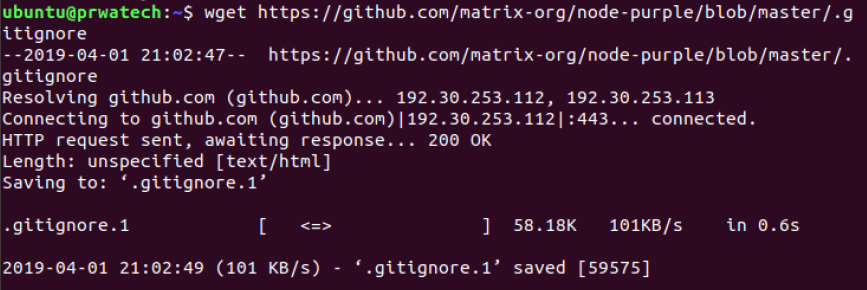Hadoop Basic Linux Commands
Welcome to the world of best Linux commands used in Hadoop, In This tutorial, one can easily learn a List of all Top Rated Hadoop basic Linux commands which are available and are used by most of the Hadoop developers. Are you also dreaming to become to certified Pro Developer, then stop just dreaming get your Hadoop certification course from India’s Leading Big Data Training institute. So follow the below mentioned basic Linux commands for Hadoop from Prwatech and learn Hadoop Course like a pro from today itself under 15+ Years of Hands-on Experienced Professionals.
Basic Linux commands used in Hadoop
ls ⇒ directory listing ls -al ⇒ formatted listing with hidden files
ls -al ⇒ formatted listing with hidden files
 cd dir ⇒ change directory to dir
cd dir ⇒ change directory to dir
 cd ⇒ change to home
cd ⇒ change to home
 pwd ⇒ shows current directory
pwd ⇒ shows current directory
 mkdir dir ⇒ create a directory dir
mkdir dir ⇒ create a directory dir
 rm file ⇒ delete the file
rm file ⇒ delete the file
 rm -f file ⇒ force remove the file
rm -f file ⇒ force remove the file
 mv file1 file2 ⇒ rename or move file1 to file2 if file2 is an existing directory, moves file1 into
directory file2
mv file1 file2 ⇒ rename or move file1 to file2 if file2 is an existing directory, moves file1 into
directory file2
 ln -s file link ⇒ create a symbolic link to file
ln -s file link ⇒ create a symbolic link to file
 touch file ⇒ create or update file
touch file ⇒ create or update file
 cat > file ⇒ places standard input into the file
cat > file ⇒ places standard input into the file
 more file ⇒ output the contents of the file
more file ⇒ output the contents of the file
 head file ⇒ output the first 10 lines of the file
head file ⇒ output the first 10 lines of the file
 tail file ⇒ output the last 10 lines of the file
tail file ⇒ output the last 10 lines of the file
 tail -f file ⇒ output the contents of the file as it
grows, starting with the last 10 lines
tail -f file ⇒ output the contents of the file as it
grows, starting with the last 10 lines

Permission Commands:
chmod ⇒ modify file access rights su ⇒ temporarily become the superuser
su ⇒ temporarily become the superuser
 sudo ⇒ temporarily become the superuser
sudo ⇒ temporarily become the superuser
 chowm ⇒ change file ownership
chowm ⇒ change file ownership
 chgrp ⇒ change a file's group ownership
chgrp ⇒ change a file's group ownership

System Info Commands :
date ⇒ shows the current date and time cal ⇒ show this month's calendar
cal ⇒ show this month's calendar
 uptime ⇒ show current uptime
uptime ⇒ show current uptime
 w ⇒ display who is online
w ⇒ display who is online
 whoami ⇒ who you are logged in as
whoami ⇒ who you are logged in as
 finger user ⇒ display information about user
finger user ⇒ display information about user
 uname -a ⇒ show kernel information
uname -a ⇒ show kernel information
 cat /proc/cpuinfo ⇒ cpu information
cat /proc/cpuinfo ⇒ cpu information
 cat /proc/meminfo ⇒ memory information
cat /proc/meminfo ⇒ memory information
 man command ⇒ show the manual for command
man command ⇒ show the manual for command
 df ⇒ show disk usage
df ⇒ show disk usage
 du ⇒ show directory space usage
du ⇒ show directory space usage
 free ⇒ show memory and swap usage
free ⇒ show memory and swap usage
 whereis app ⇒ show possible locations of app
whereis app ⇒ show possible locations of app

Process Management Commands:
ps ⇒ display your currently active processes top ⇒ display all running processes
top ⇒ display all running processes
 kill pid ⇒ kill process id pid
kill pid ⇒ kill process id pid
 killall proc ⇒ kill all processes named proc *
killall proc ⇒ kill all processes named proc *
 bg ⇒ lists stopped or background jobs; resume a
stopped job in the background
bg ⇒ lists stopped or background jobs; resume a
stopped job in the background
 fg ⇒ brings the most recent job to foreground
fg ⇒ brings the most recent job to foreground
 fg n ⇒ brings job n to the foreground
fg n ⇒ brings job n to the foreground

SSH Commands
sshuser@host ⇒ connect to host as the user ssh -p port user@host ⇒ connect to host on port
port as user
ssh -p port user@host ⇒ connect to host on port
port as user
 ssh-copy-id user@host ⇒ add your key to host for
user to enable a keyed or passwordlesslogin
ssh-copy-id user@host ⇒ add your key to host for
user to enable a keyed or passwordlesslogin

Searching Commands
grep pattern files ⇒ search for pattern in files grep -r pattern dir ⇒ search recursively for
pattern in dir
grep -r pattern dir ⇒ search recursively for
pattern in dir

 command | grep pattern ⇒ search for pattern in the output of the command
command | grep pattern ⇒ search for pattern in the output of the command
 locate file ⇒ find all instances of file
locate file ⇒ find all instances of file

Network Commands
ping host ⇒ ping host and output results whois domain ⇒ get whoisinformation for domain
whois domain ⇒ get whoisinformation for domain
 dig domain ⇒ get DNS information for domain
dig domain ⇒ get DNS information for domain
 dig -x host ⇒ reverse lookup host
dig -x host ⇒ reverse lookup host
 wget file ⇒ download file
wget file ⇒ download file
 wget -c file ⇒ continue a stopped download
wget -c file ⇒ continue a stopped download

Installation Commands
Install from source: ./configure
make
make install
./configure
make
make install




